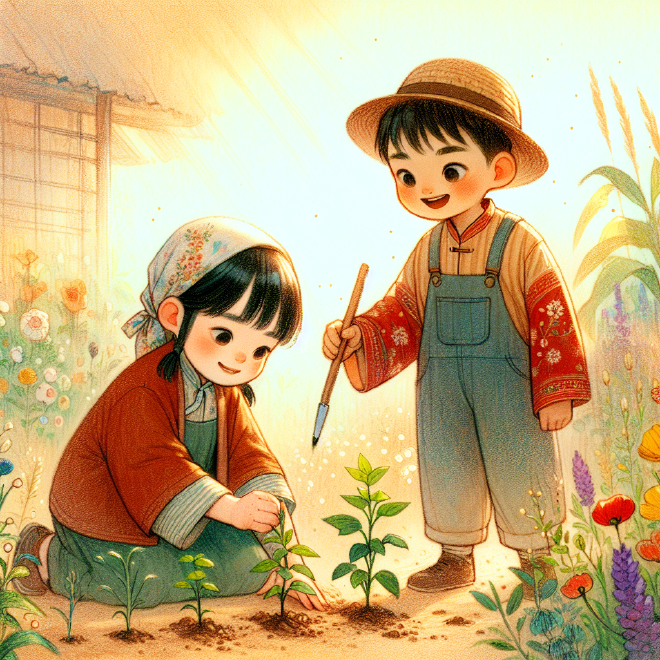失蹤的耳環

Table of Contents
Audio #
汉字 #
丽丽和小明是好朋友。春天来了,他们想一起种一个小花园。
丽丽说:“小明,我们种什么好呢?”
小明说:“我们可以种花,也可以种菜。你喜欢什么?”
丽丽想了想,说:“我喜欢花!我们种一些红色的玫瑰花和黄色的向日葵,好吗?”
小明笑着说:“好啊!我还想种一些绿色的生菜和红色的西红柿。这样,我们的花园就有很多颜色了!”
他们一起买了花种子和菜种子。他们先挖了一个小坑,然后把种子放进去,再盖上土。丽丽和小明每天都给花园浇水,还拔掉杂草。
过了一段时间,玫瑰花和向日葵都长出来了,生菜和西红柿也开始长大。花园里充满了美丽的颜色和新鲜的味道。
丽丽和小明非常高兴。他们知道,只要努力,就能让小小的种子变成美丽的花园。他们也明白了,保护环境很重要,我们要好好照顾大自然。
秋天的时候,他们收获了很多西红柿和生菜,还把一些花送给了他们的朋友。他们决定明年春天再种一个更大的花园。
Pinyin #
Lìlì hé Xiǎomíng shì hǎo péngyou. Chūntiān lái le, tāmen xiǎng yīqǐ zhòng yī ge xiǎo huāyuán.
Lìlì shuō: “Xiǎomíng, wǒmen zhòng shénme hǎo ne?”
Xiǎomíng shuō: “Wǒmen kěyǐ zhòng huā, yě kěyǐ zhòng cài. Nǐ xǐhuan shénme?”
Lìlì xiǎng le xiǎng, shuō: “Wǒ xǐhuan huā! Wǒmen zhòng yīxiē hóngsè de méiguī huā hé huángsè de xiàngrìkuí, hǎo ma?”
Xiǎomíng xiào zhe shuō: “Hǎo a! Wǒ hái xiǎng zhòng yīxiē lǜsè de shēngcài hé hóngsè de xīhóngshì. Zhèyàng, wǒmen de huāyuán jiù yǒu hěn duō yánsè le!”
Tāmen yīqǐ mǎi le huā zhǒngzi hé cài zhǒngzi. Tāmen xiān wā le yī ge xiǎo kēng, ránhòu bǎ zhǒngzi fàng jìnqù, zài gài shàng tǔ. Lìlì hé Xiǎomíng měitiān dōu gěi huāyuán jiāoshuǐ, hái bá diào zácǎo.
Guò le yī duàn shíjiān, méiguī huā hé xiàngrìkuí dōu zhǎng chūlai le, shēngcài hé xīhóngshì yě kāishǐ zhǎng dà. Huāyuán lǐ chōngmǎn le měilì de yánsè hé xīnxiān de wèidao.
Lìlì hé Xiǎomíng fēicháng gāoxìng. Tāmen zhīdào, zhǐyào nǔlì, jiù néng ràng xiǎo xiǎo de zhǒngzi biànchéng měilì de huāyuán. Tāmen yě míngbái le, bǎohù huánjìng hěn zhòngyào, wǒmen yào hǎohāo zhàogù dàzìrán.
Qiūtiān de shíhou, tāmen shōuhuò le hěn duō xīhóngshì hé shēngcài, hái bǎ yīxiē huā sòng gěi le tāmen de péngyou. Tāmen juédìng míngnián chūntiān zài zhòng yī ge gèng dà de huāyuán.
English Translation #
Lili and Xiaoming are good friends. Spring came, and they wanted to plant a small garden together.
Lili said, “Xiaoming, what should we plant?”
Xiaoming said, “We can plant flowers, or we can plant vegetables. What do you like?”
Lili thought for a moment and said, “I like flowers! Can we plant some red roses and yellow sunflowers?”
Xiaoming smiled and said, “Okay! I also want to plant some green lettuce and red tomatoes. That way, our garden will have lots of colors!”
They bought flower seeds and vegetable seeds together. They first dug a small hole, then put the seeds in, and then covered them with soil. Lili and Xiaoming watered the garden every day and also pulled out weeds.
After a while, the roses and sunflowers grew, and the lettuce and tomatoes also started to grow. The garden was filled with beautiful colors and fresh smells.
Lili and Xiaoming were very happy. They knew that if they worked hard, they could turn small seeds into a beautiful garden. They also understood that protecting the environment is very important, and we should take good care of nature.
In the autumn, they harvested many tomatoes and lettuce and also gave some flowers to their friends. They decided to plant a bigger garden again next spring.
Grammatical Points and Analysis #
Modal Particle “呢 (ne)”: #
- Used at the end of the question “我们种什么好呢?(Wǒmen zhòng shénme hǎo ne?)” to soften the tone and express a suggestion.
Verb-Object Phrases: #
- 种花 (zhòng huā): to plant flowers
- 种菜 (zhòng cài): to plant vegetables
- 浇水 (jiāoshuǐ): to water
- 拔草 (bá cǎo): to pull weeds
- 保护环境 (bǎohù huánjìng): to protect the environment
- 照顾大自然 (zhàogù dàzìrán): to take care of nature
Resultative Complements: #
- 长出来 (zhǎng chūlai): to grow out (chūlai indicates the result of growing)
- 长大 (zhǎng dà): to grow up (dà indicates the result of growing)
- 挖了一个小坑 (wā le yī ge xiǎo kēng): dug a small hole (了 indicates the action is completed)
的 (de) Structure: #
- 红色的玫瑰花 (hóngsè de méiguī huā): red roses
- 黄色的向日葵 (huángsè de xiàngrìkuí): yellow sunflowers
- 绿色的生菜 (lǜsè de shēngcài): green lettuce
- 红色的西红柿 (hóngsè de xīhóngshì): red tomatoes
Use of “还 (hái)”: #
- 我还想种一些绿色的生菜 (Wǒ hái xiǎng zhòng yīxiē lǜsè de shēngcài): I also want to plant some green lettuce. “还” indicates “also” or “in addition”.
Questions #
- 丽丽和小明种了什么颜色的花? (Lìlì hé Xiǎomíng zhòng le shénme yánsè de huā?) What color flowers did Lili and Xiaoming plant?
Click to show the answer
answer #
他们种了红色的玫瑰花和黄色的向日葵。(Tāmen zhòng le hóngsè de méiguī huā hé huángsè de xiàngrìkuí.) They planted red roses and yellow sunflowers.
- 除了花以外,丽丽和小明还种了什么菜?(Chúle huā yǐwài, Lìlì hé Xiǎomíng hái zhòng le shénme cài?) Besides flowers, what vegetables did Lili and Xiaoming plant?
Click to show the answer
answer #
他们还种了绿色的生菜和红色的西红柿。(Tāmen hái zhòng le lǜsè de shēngcài hé hóngsè de xīhóngshì.) They also planted green lettuce and red tomatoes.
Disclaimer: This story is purely fictional and generated by AI. Any similarities to real people, places, or events are purely coincidental.